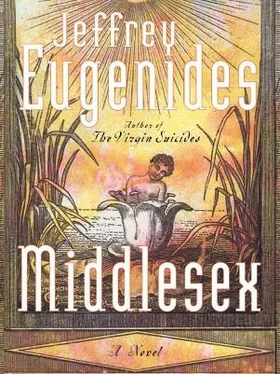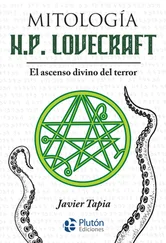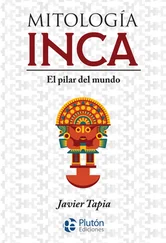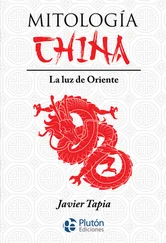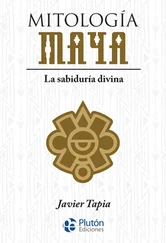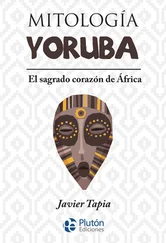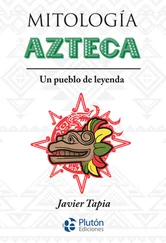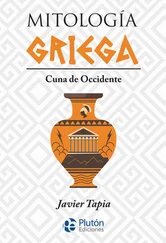“Will you look at this place?” Tessie whispered.
“Sort of unusual decor,” said Milton.
And I: “What are we doing here?”
It was right then that the door opened and Dr. Luce presented himself.
At that stage, I didn’t know about his glamour status in the field. I had no idea of the frequency with which Luce’s name appeared in the relevant journals and papers. But I saw right away that Luce wasn’t your normal-looking doctor. Instead of a medical coat he wore a suede vest with fringe. Silver hair touched the collar of his beige turtleneck. His pants were flared and on his feet were a pair of ankle boots with zippers on the sides. He had eyeglasses, too, silver wire-rims, and a gray mustache.
“Welcome to New York,” he said. “I’m Dr. Luce.” He shook my father’s hand, then my mother’s, and finally came to me. “You must be Calliope.” He was smiling, relaxed. “Let’s see if I can remember my mythology. Calliope was one of the Muses, right?”
“Right.”
“In charge of what?”
“Epic poetry.”
“You can’t beat that,” said Luce. He was trying to act casual, but I could see he was excited. I was an extraordinary case, after all. He was taking his time, savoring me. To a scientist like Luce I was nothing less than a sexual or genetic Kaspar Hauser. There he was, a famous sexologist, a guest on Dick Cavett , a regular contributor to Playboy , and suddenly on his doorstep, arriving out of the woods of Detroit like the Wild Boy of Aveyron, was me, Calliope Stephanides, age fourteen. I was a living experiment dressed in white corduroys and a Fair Isle sweater. This sweater, pale yellow, with a floral wreath at the neck, told Luce that I refuted nature in just the way his theory predicted. He must have hardly been able to contain himself, meeting me. He was a brilliant, charming, work-obsessed man, and watched me from behind his desk with keen eyes. While he chatted, speaking primarily to my parents, gaining their confidence, Luce was nevertheless making mental notes. He registered my tenor voice. He noted that I sat with one leg tucked under me. He watched how I examined my nails, curling my fingers into my palm. He paid attention to the way I coughed, laughed, scratched my head, spoke; in sum, all the external manifestations of what he called my gender identity.
He kept up the calm manner, as if I had come to the Clinic with nothing more than a sprained ankle. “The first thing I’d like to do is give Calliope a short examination. If you’d care to wait here in my office, Mr. and Mrs. Stephanides.” He stood up. “Would you come with me please, Calliope?”
I got up from my chair. Luce watched as the various segments, like those of a collapsible ruler, unfolded themselves, and I attained my full height, an inch taller than he was himself.
“We’ll be right here, honey,” Tessie said.
“We’re not going anywhere,” said Milton.
Peter Luce was considered the world’s leading authority on human hermaphroditism. The Sexual Disorders and Gender Identity Clinic, which he founded in 1968, had become the foremost facility in the world for the study and treatment of conditions of ambiguous gender. He was the author of a major sexological work, The Oracular Vulva, which was standard in a variety of disciplines ranging from genetics and pediatrics to psychology. He had written a column by the same name for Playboy from August 1972 to December 1973 in which the conceit was that a personified and all-knowing female pudendum answered the queries of male readers with witty and sometimes sibylline responses. Hugh Hefner had come across Peter Luce’s name in the papers in connection with a demonstration for sexual freedom. Six Columbia students had staged an orgy in a tent on the main green, which the cops broke up, and when asked what he thought about such activity on campus, Prof. Peter Luce, 46, had been quoted as saying, “I’m in favor of orgies wherever they happen.” That caught Hef’s eye. Not wanting to replicate Xaviera Hollander’s “Call Me Madam” column in Penthouse , Hefner saw Luce’s contribution as being devoted to the scientific and historical side of sex. Thus, in her first three issues, the Oracular Vulva delivered disquisitions on the erotic art of the Japanese painter Hiroshi Yamamoto, the epidemiology of syphilis, and the sex life of St. Augustine. The column proved popular, though intelligent queries were always hard to come by, the readership being more interested in the “Playboy Advisor” ‘s cunnilingus tips or remedies for premature ejaculation. Finally, Hefner told Luce to write his own questions, which he was only too glad to do.
Peter Luce had appeared on Phil Donahue along with two hermaphrodites and a transsexual to discuss both the medical and psychological aspects of these conditions. On that program, Phil Donahue said, “Lynn Harris was born and raised a girl. You won the Miss Newport Beach Contest in 1964 in good old Orange County, California? Boy, wait till they hear this. You lived as a woman to the age of twenty-nine and then you switched to living as a man. He has the anatomical characteristics of both a man and a woman. If I’m lyin’, I’m dyin’.”
He also said, “Here’s what’s not so funny. These live, irreplaceable sons and daughters of God, human beings all, want you to know, among other things, that that’s exactly what they are, human beings.”
Because of certain genetic and hormonal conditions, it was sometimes very difficult to determine the sex of a newborn baby. Confronted with such a child, the Spartans had left the infant on a rocky hillside to die. Luce’s own forebears, the English, didn’t even like to mention the subject, and might never have done so had the nuisance of mysterious genitalia not thrown a wrench into the smooth workings of inheritance law. Lord Coke, the great British jurist of the seventeenth century, tried to clear up the matter of who would get the landed estates by declaring that a person should “be either male or female, and it shall succeed according to the kind of sex which doth prevail.” Of course, he didn’t specify any precise method for determining which sex did prevail. For most of the twentieth century, medicine had been using the same primitive diagnostic criterion of sex formulated by Klebs way back in 1876. Klebs had maintained that a person’s gonads determined sex. In cases of ambiguous gender, you looked at the gonadal tissue under the microscope. If it was testicular, the person was male; if ovarian, female. The hunch here was that a person’s gonads would orchestrate sexual development, especially at puberty. But it turned out to be more complicated than that. Klebs had begun the task, but the world had to wait another hundred years for Peter Luce to come along and finish it.
In 1955, Luce published an article called “Many Roads Lead to Rome: Sexual Concepts of Human Hermaphroditism.” In twenty-five pages of forthright, high-toned prose, Luce argued that gender is determined by a variety of influences: chromosomal sex; gonadal sex; hormones; internal genital structures; external genitals; and, most important, the sex of rearing. Drawing on studies of patients at the pediatric endocrine clinic at New York Hospital, Luce was able to compile charts demonstrating how these various factors came into play, and showing that a patient’s gonadal sex often didn’t determine his or her gender identity. The article made a big splash. Within months, pretty much everyone had given up Klebs’s criterion for Luce’s criteri a .
On the strength of this success, Luce was given the opportunity to open the Psychohormonal Unit at New York Hospital. In those days he saw mostly kids with adrenogenital syndrome, the most common form of female hermaphroditism. The hormone cortisol, recently synthesized in the lab, had been found to arrest the virilization these girls normally underwent, allowing them to develop as normal females. The endocrinologists administered the cortisol and Luce oversaw the girls’ psychosexual development. He learned a lot. In a decade of solid, original research, Luce made his second great discovery: that gender identity is established very early on in life, about the age of two. Gender was like a native tongue; it didn’t exist before birth but was imprinted in the brain during childhood, never disappearing. Children learn to speak Male or Female the way they learn to speak English or French.
Читать дальше
Конец ознакомительного отрывка
Купить книгу
